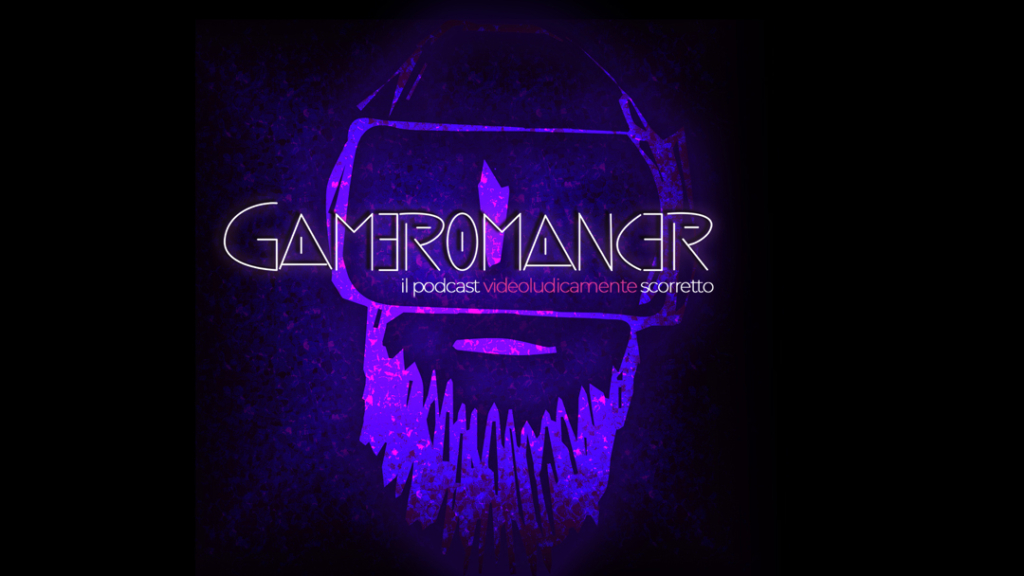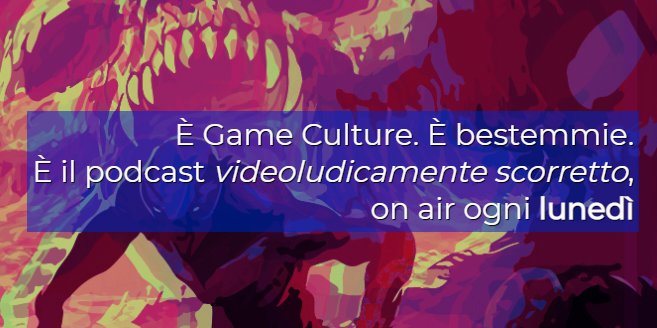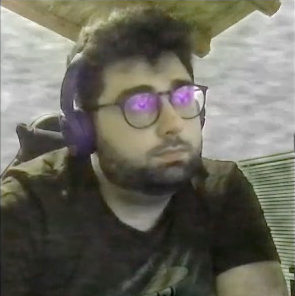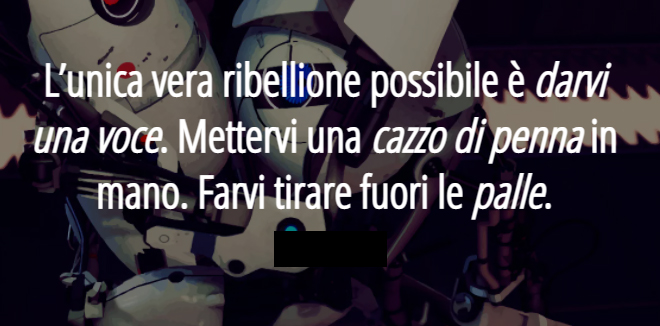I came across the following by chance.
Gameromancer.
Julia passed me a podcast that talked about PR in video games very interesting.
I thought it was the usual interview-style podcast. Walking by, I launched the audio, curious to understand the world of “video game PR.”
Immediately I realized that I was not holding the usual style or approach but more importantly the usual podcast.
I found myself in the middle of a living room with friends listening to a sincere conversation.
The tone of the discussion was confidential, enriched by many very often unkind slang expressions.
But instead of annoying me, he granted me the intimacy I needed to feel comfortable.
The topics covered were very interesting, and in those informal exchanges of thoughts I found immense expertise that gave solidity to everything I listened to.
Immediately upon returning home I went to check who these guys were, I wanted to know and understand what I had come across.
I open their portal and find another level of awareness:

“Gameromancer: The Videoludically Incorrect Podcast.”
A site, clean of banner ads, with clear and raw messages but at the same time very shareable.
At least by me. It continues with:
“The other game podcasts have broken …….”
“We are the ones not to hang out with, the ones who open podcasts by swearing while blathering about Ars Ludica.“
I threw myself into exploration: podcasts, articles and concepts.
Even now I still don’t understand how they are not one of the video game news outlets that appear when you do a Google search.
You find sincerity, freedom and expertise not driven by the interests of those who can buy an interview.
Deeply impressed by the irreverent brazenness of this group I joined their telegram, the one where, according to their portal, they give their worst.
I was immediately greeted by
Peter
and the others, curious about how I had found them, and we started chatting.

I couldn’t help but ask for an interview, just to understand better…..so let’s get started!!!
From the Gameromancer team participated: Francesco Alteri, Peter Iacullo e Andrea Sorichetti.
The heart of the project.
During the interview their voices took turns maintaining and for ease of reading I will not highlight who said what, but their common thought.
Let’s talk about you, who are you?
And off we go right away with a Gameromance definition:
“We’re three str**** who do things because they’re sick and tired of seeing others doing things that basically hurt.”
A few laughs but then they point out:
“We wanted to find our own way in this industry, which in our opinion has so many problems, and we wanted to highlight what are the flaws of the industry that the Italian press.
The idea is to highlight problems to try to solve them through dialogue. Although Gameromancer’s tones may seem violent, nasty but they are still ways that open up dialogue.
We are very proud of the community we have designed because there is so much discussion.
Over time Gameromancer expanded and got bigger and started to cover different topics as well, such as feminism, game development, and slowly we realized that we also wanted to do self-criticism as gamers.
We really put a lot of emphasis on what Indie studies are on both Italian and foreign ones. Obviously on the Italian ones we can do much more by bringing them to Podcast and following the teams themselves. Of course we also view Triple A titles with the products of the moment.
To sum up, we want to talk about Video Games and we do not want to do it as the clones of portals that already exist both in Italy and abroad. The old way, which in our opinion, as authors, is a kind of waste of time.
This we saw inside Gameromancer, a new way of dealing with certain topics and doing it without barriers of any kind.”

Peter “Phatejoker” Iacullo
Creative Director (or Final Boss)
What one grasps from your articles and audios is the sense of freedom of expression.
“The project was born for just that, we used to write on other portals, including our second sister portal I Love Videogames and also other external newsrooms. We had to work along a very narrow editorial line, and this weighed heavily on us.
The freedom to be able to write the content the way we want is fundamental.
Since we don’t have publishers behind us, we can be the ones who decide by putting the passion we have into it.”
“The beauty of our podcasts, which for the past year or so have intentionally lost structure and lineup, are open mic discussions where we can put ourselves and our knowledge to use talking about topics we love.”
I was struck by the phrase “I Love Videogames, the combed and socially acceptable face of our network,” why the two portals?
“
I Love Videogames
has been in existence since 2014. At first Peter held the role of webmaster, then over time he came to manage it fully and independently. Gameromancer started out as an ILVG (I love Videogames) podcast and later we decided to unhook it with its own portal since it was taking a different turn from ILVG.”
its own portal since it was taking a different turn from ILVG.”

Francis “TheLawyer” Alteri

Andrea “CyberMantis” Sorichetti
“We didn’t want to be a clone of Multiplayer.co.uk or everyeye.co.uk and were driven by passion. With ILVG we want to try to stick to the rules…but in our own way and sometimes go even further. ILVG is our ideal video game site that reflects the need to also be with the video game industry, while Gameromancer expresses our need to go against it.”
Crowdsourcing: another interesting initiative, to which I can only tip my hat. Can you tell me about it?
“One of the most beautiful ideas we’ve ever had. He was born in the summer of Gameromancer’s first year from an idea he had long before…
we thought about how it would be nice to give everyone space to be able to write. In that summer a girl came to us and asked if she could publish a piece. From there, things moved.
After all, our main motto is “Join the rebellion,” and what rebellion would it be if we just did everything ourselves? So the
crowsourcing
represents us very much together with our community and represents that expression of freedom that we have already mentioned.
We are much happier with the pieces we receive than with the pieces we write. Andrea for example comes from crowsourcing, where he wrote the first piece of his life and from there he then approached the project. Many memorable writings came from that channel. We believe because of a need that people have to write and express themselves. But the real strength of crowdsourcing is that it goes and disrupts one of the big rules of the industry, where you actually have to have some kind of pedigree to be allowed to write.”
Clark Kent/Superman, Peter Parker/Spiderman, Donald Duck/Paperinik all with double lives–work by day and passion by night. Have you ever tried to combine them and monetize what you have done so far?
“Ever since we started, we never thought of making a profit on this initiative. We recently opened a patreon following the demand of our community, something also comes to us from twitch.”

But in fact we don’t have that desire, the numbers to do in order to maintain an editorial staff are too high and not worth it.
We are a niche project.
This could be a topic to talk about in the future but we are not convinced. The little revenue we have is used to maintain our l l infrastructure.”
Listening to your podcasts reveals, not only a deep knowledge of video games, but also a love that only those who experience it can recognize. So let’s talk about your first video game that you played.
The answer comes straight from Peter pointing to one of the cult games of all time Prince of Persia (1990) on Windows 3.1. Andrea, on the other hand, digging deep into her memory, fishes out Crash Bandicoot (1996). Francis remembers games that, as a child, he could only watch. While the very one he played was The Skier (1987) which we have a memory of in newsstand collections like Mega Games for Commodore 64/128.
Rudy Bandiera, author of The Gamer has a motto that says, “If you don’t like video games, it’s only because you haven’t found the game that’s right for you yet” What do you think?
“We pretty much agree, every person will definitely have a video game that they may like. In fact a game is media and as such it must come to you. Unfortunately, there is little culture about video games, so it is very difficult for it to get to you like other media where we have even a school culture.
The movie you like comes sooner or later. A song you like will come sooner or later. A painting that you like comes sooner or later. For video games even today culturally there is a preconception that blocks this. If you play video games you are in fact a child. If there was more culture on this topic everything would be very different.”
Do you think the new generation will change anything?
“The new generation of gamers are used to free-to-play, they get free games and tend to have a very industrial conception of gaming. They are used to competitive games. They will hardly come in contact with games like Shadow of the Colossus or ICO.
Let’s say it’s a different approach.
What will perhaps turn things around is the awareness that the games industry is having of its own economic strength, and perhaps that will be the impetus for change.
Let’s try to look beyond these particular years, what do you think will be the innovative idea for the video game of 2022?
“Out-of-the-box ideas are hard to pull out, meanwhile, you have to get the idea of focusing on Pixel Art graphics out of your head. Get it out of the way that she is the one selling. If you do it just for that and for the sake of doing it, better avoid it. In our opinion it should be used only if it makes sense within the game. An example of pixel art done well is found in The Messenger.
Innovative games will be those that have the strongest sound impact.
The are undergoing a major evolution. People need to hear more than they need to see. Sony itself is developing a new audio mode. So well-done audio that is well connected to the game could make a difference.
Another feature we are enjoying these days are short video games with strong narrative impact. A game with an average duration of 3 hours is in fact affordable.”
Since the days of the old print video game magazines, game reviews and ratings were always untrue or inflated. High ratings given to games that were worth a tenth of that. Resulting in a waste of money on the part of the unfortunate player. Do you guys have any advice to warn against careless purchases?
“On grades the climate has not changed in recent times, the sufficiency always starts from 8.
We are largely opposed to the use of votes and forcefully put them in. Good advice is to read from many more sources so as to range and thus identify what the reality is.
However, we also return to the culture that is there now. We know, even based only on the title, what the game will most likely be like. To explain it better, it’s like the issue of phishing, if you know what it is you can detect it much earlier.
Knowing the industrial operation actually helps you in understanding a lot about a game.
Another important thing is to be able to question the purchases you have made; recognizing that you have bought a bad game gives you the experience you need not to relapse.
Another tip for younger people is to understand that 90 percent of promotional material is fake.
It might also help a lot to follow some foreign youtube channels that do real Game Culture”

What do you see in the future of Gameromancer?
Peter – “We hope to continue making content with this team. We don’t actually have goals of increasing likes or anything else. We are interested in having fun while making our content. Maybe to have more people crowdsourcing writing.”
Andrea – “I personally hope that gameromancer becomes bigger so that we can give more visibility to the indies we cover. I would love to be able to say that gameromancer has helped the sale of an indie game.”
Francis – “I hope I can continue to do the things that I enjoy most like doing the Podcasts dialoguing with the community. But most of all I hope gameromancer will provide the impetus to change things. We may not be ni to make the change, but I hope we can be the beginning, the seed of change. If we succeed in this then we have accomplished our goal.”
Let’s say that this was a pleasant chat with a team of people whose competence and passion I sensed. Listening to their podcasts puts you in a living room at home with friends whose merits and flaws you can appreciate.
Greetings from your developer
Lothar
